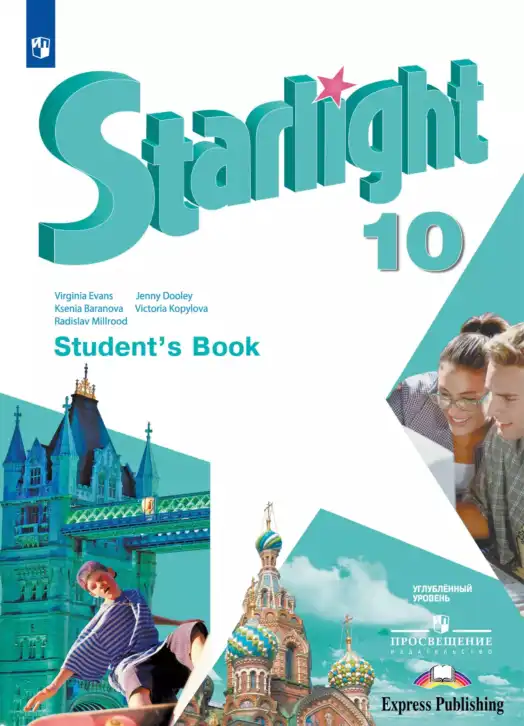Номер 2, страница 96 - гдз по английскому языку 10 класс (starlight) учебник Баранова, Дули

Авторы: Баранова К. М., Дули Д., Копылова В. В., Мильруд Р. П., Эванс В.
Тип: Student's book (Учебник)
Серия: starlight (звёздный английский)
Издательство: Просвещение, Express Publishing
Год издания: 2019 - 2026
Уровень обучения: углублённый
Цвет обложки: белый, бирюзовый
ISBN: 978-5-09-112205-3
Допущено Министерством просвещения Российской Федерации
Популярные ГДЗ в 10 классе
Module 3. Travel Time. Focus on RNE - номер 2, страница 96.
№2 (с. 96)
Условие. №2 (с. 96)
скриншот условия


2 Match texts A-G with headings 1-8.
Each number can only be used once. There is one extra heading.
A Compared to some others, the word 'tourist' is fairly new, first recorded in 1772. It is connected to words in Latin and ancient Greek, 'tornare' and 'tornos' respectively, both referring to a turning movement around a centre. In other words, they suggest travelling in a circle, which can be contrasted with the usual purpose of travel – to get from A to B. This meaning perfectly fits the idea of the tourist as someone who travels with the intention of returning home afterwards.
B Tourism may be a leisure industry, but it is far from an unimportant one. Even if it is just something people purchase with their excess income, after rent and food are paid for, it is a major source of income for many countries. For some, indeed, it is the main one. Often in developing countries there is little else in the way of employment and foreign currency earnings.
C There were tourists in ancient times, but they tended to be the wealthy. In medieval times, religious pilgrimages were the main form of tourism, but again most people spent any holidays they had at home. It was really after the Industrial Revolution that considerable numbers of people began to have enough spare money and time to take holidays, mostly within their own countries. This was when, in the UK, the seaside resorts like Brighton, Blackpool and so on became such a huge part of the national culture.
D The next frontier is no doubt space tourism. There is talk of visits to Mars and hotels on the moon, but these are certainly some way off. Within our lifetime, however, it's likely we'll travel on planes capable of reaching heights where the effect of gravity disappears. We'll be able to see the curve of the Earth showing against the darkness of space. Also quite possible in the not too distant future are trips orbiting plant Earth.
E It was when aeroplane travel became affordable that the revolution in overseas travel took place. No longer confined to the elite, the holiday abroad became the annual holiday of choice for millions. Suddenly, the Greek Islands, the Bahamas, the Canaries, and many many more, became familiar names on the lips of everyone. For these places, too, life was transformed, for better or worse.
F Whether a skiing break in the Swiss Alps, a beach stay in Majorca or a sightseeing tour of Saint Petersburg, the annual holiday is something almost everyone looks forward to. This is probably because of the change of scene and the break from routine, even though it would be objectively more restful to stay at home. But despite the stress of airports and packing and injections and everything else, the holiday rejuvenates us far more than sitting at home on the couch.
G A tourist is understood differently by different people. The most basic definition is that of people moving temporarily away from the place where they live or work, but not for purposes of work or any other kind of business activity. It is the 'or pleasure' part of the classic airport question 'Business or pleasure?' It is also a word that is used negatively, by travellers or locals who consider that the tourist is not terribly interested in the people or place they are visiting.
1 Why holidays help
2 How the term is viewed
3 When foreign travel boomed
4 Why people rely on tourism
5 Where the term originated
6 What sort of tourist you are
7 How tourism grew
8 What developments to expect
| A | B | C | D | E | F | G |
|---|---|---|---|---|---|---|
Решение 1. №2 (с. 96)


Решение 2. №2 (с. 96)

Решение 3. №2 (с. 96)
Сопоставьте тексты A-G с заголовками 1-8. Каждый номер можно использовать только один раз. Один заголовок лишний.
Ответ:
| A | B | C | D | E | F | G |
|---|---|---|---|---|---|---|
| 5 | 4 | 7 | 8 | 3 | 1 | 2 |
A - 5: Where the term originated / Где зародился термин
B - 4: Why people rely on tourism / Почему люди полагаются на туризм
C - 7: How tourism grew / Как развивался туризм
D - 8: What developments to expect / Каких изменений ожидать
E - 3: When foreign travel boomed / Когда начался бум на зарубежные поездки
F - 1: Why holidays help / Почему отпуск полезен
G - 2: How the term is viewed / Как воспринимается этот термин
Другие задания:
Помогло решение? Оставьте отзыв в комментариях ниже.
Присоединяйтесь к Телеграм-группе @top_gdz
ПрисоединитьсяМы подготовили для вас ответ c подробным объяснением домашего задания по английскому языку за 10 класс, для упражнения номер 2 расположенного на странице 96 к Учебник (Student's book) серии звёздный английский , starlight (старлайт) 2019 года издания для учащихся школ и гимназий.
Теперь на нашем сайте ГДЗ.ТОП вы всегда легко и бесплатно найдёте условие с правильным ответом на вопрос «Как решить ДЗ» и «Как сделать» задание по английскому языку к упражнению №2 (с. 96), авторов: Баранова (Ксения Михайловна), Дули (Дженни ), Копылова (Виктория Викторовна), Мильруд (Радислав Петрович), Эванс (Вирджиния ), ФГОС (старый) углублённый уровень обучения учебного пособия издательства Просвещение, Express Publishing.



















